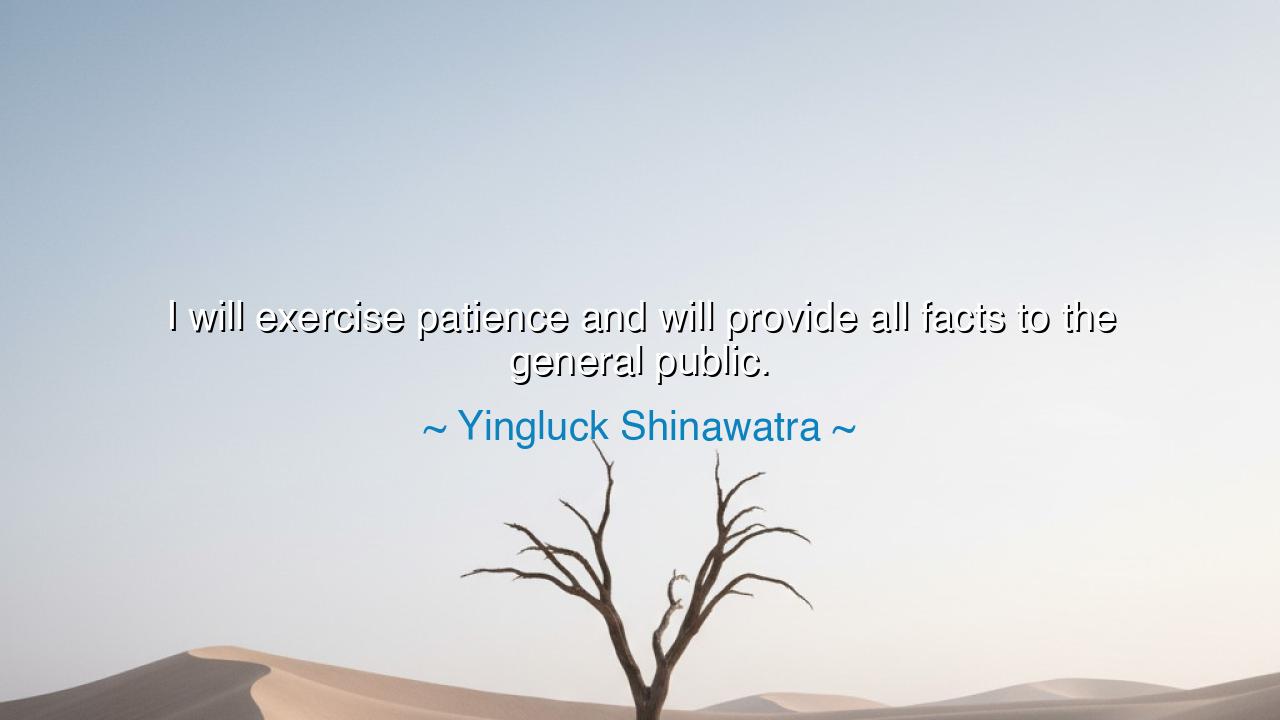
I will exercise patience and will provide all facts to the






Hear, O seekers of truth, the solemn words of Yingluck Shinawatra, who once declared in the midst of turmoil: “I will exercise patience and will provide all facts to the general public.” These words are not merely the speech of a leader under trial, but the embodiment of a principle as old as governance itself—that in the face of conflict, the ruler must not rush into anger nor conceal the truth, but must steady the heart with patience and guide the people with clarity. For nations, like families, are held together not by force alone, but by trust, and trust is born from truth.
In times of strife, the temptation is great to answer accusation with rage, to meet hostility with secrecy. But such paths lead only to ruin, as rulers of the past have shown. By choosing patience, Yingluck spoke of enduring insult, suspicion, and storm without allowing bitterness to dictate her course. By pledging to present the facts, she declared that the surest foundation of legitimacy is not rumor, not manipulation, but transparency. For a people can forgive mistakes, but they cannot forgive deception.
Consider, O listeners, the story of Marcus Aurelius, emperor of Rome. Beset by wars, betrayals, and plague, he might have silenced dissent with cruelty. Instead, he turned inward, writing in his Meditations of the need for patience, self-control, and the pursuit of truth. His empire endured longer because he chose not to react as a tyrant, but to lead as a philosopher. So too does Yingluck’s promise echo this ancient wisdom: that strength is shown not in speed of retaliation, but in steadiness of spirit.
History also warns us of the opposite. Think of Richard Nixon in the Watergate scandal. Rather than provide the facts openly, he cloaked the truth in layers of secrecy, and each concealment deepened the distrust of the public. In the end, it was not the crime alone, but the lack of transparency, that destroyed his rule. Thus we see the eternal law: that concealment breeds collapse, but truth, even when painful, preserves dignity and trust.
The meaning of Yingluck’s words lies here: that leadership is not only about command, but about example. When a leader shows patience, the people learn to endure. When a leader presents facts, the people learn to trust. And when both are joined, a society has the chance to overcome its trials without tearing itself apart. Her words remind us that truth and endurance are the twin pillars of justice.
The lesson for all who hear is this: in your own life, whether you lead many or few, embrace patience in the face of accusation, and present the facts when you are questioned. Do not hasten to anger, nor hide behind falsehood, for both will betray you in time. Instead, let your actions be transparent, your speech be honest, and your heart be steadfast. In this way, even amidst conflict, you will preserve both your dignity and the trust of others.
Practical actions are simple yet profound. When challenged, pause before you respond; let patience cool the fire of anger. When accused, gather the truth carefully and present it without fear. When you are tempted to hide your errors, remember that honesty heals faster than deceit. In families, in workplaces, in communities, these same principles hold: patience builds peace, and truth builds trust.
Therefore, O children of tomorrow, remember Yingluck Shinawatra’s vow. For though spoken in a moment of political trial, its wisdom belongs to all ages: to endure with patience, to guide with facts, and to speak openly to the public of life. In these virtues lies not only the survival of leaders, but the strength of every soul that seeks to walk in honor.






AAdministratorAdministrator
Welcome, honored guests. Please leave a comment, we will respond soon